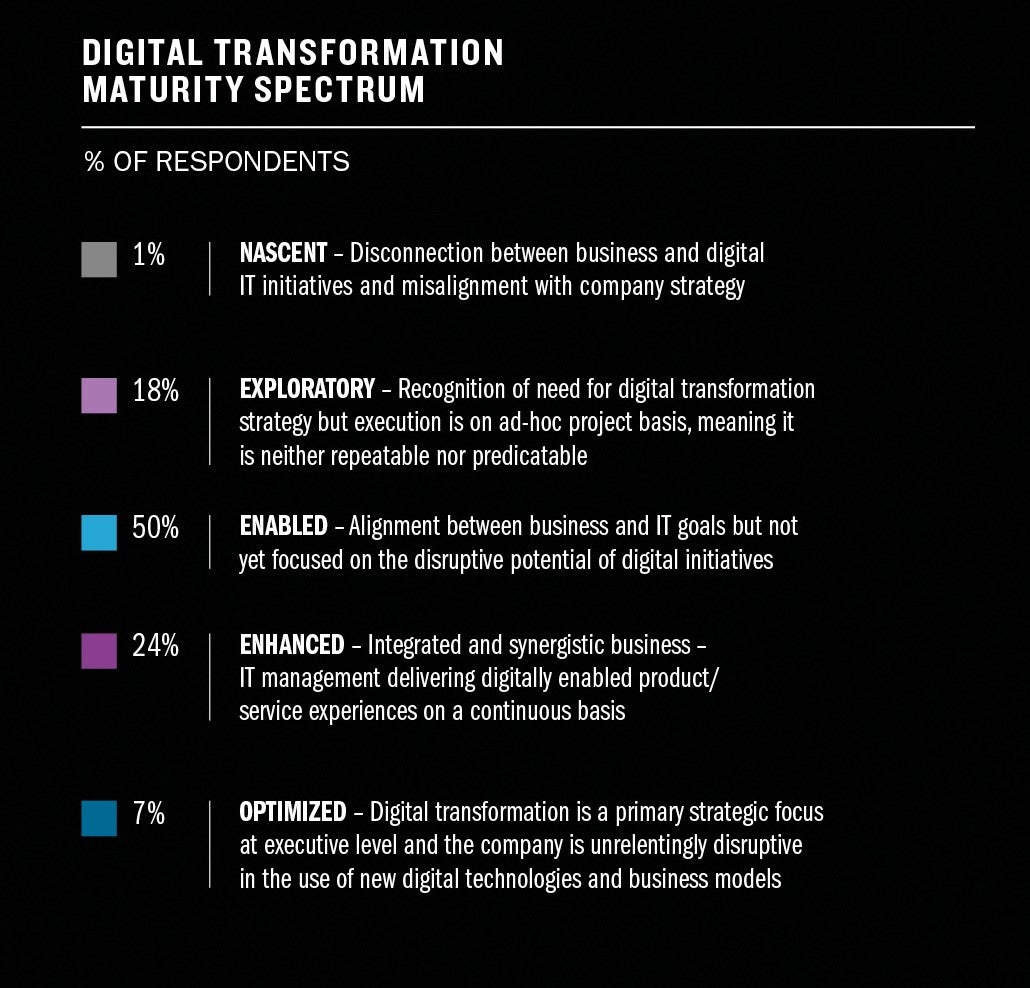Across sectors, businesses are fighting against the commoditization of their service. Globalized industries put developed markets at a disadvantage on cost, leaving firms fighting cheaper overseas rivals in a race to the bottom.
Breaking free of these chains requires qualitatively better models of service. Businesses have reimagined transport, accommodation, retail, auctions – even music consumption – using a range of digital technologies. Utilizing big data and the power of the cloud, companies can forgo commoditized products and build relationships that de-risk client investment and offer a uniquely valuable service.
Yet getting to grips with the potential of digital transformation can be challenging. The range, diversity and novelty of technology is considerable, stretching the capacity of businesses’ internal expertise. However, with the right know-how, firms can build effective strategies that transform them from being digitally “enabled” to digitally “optimized”.
The pressure to change is driven by street-level adoption of digital technologies. These enable the enhancement of day-to-day activities through online and near real-time access to tools, data or expertise. The demand for similar connectivity and access within the enterprise is driving firms towards new, more efficient ways of working.
The umbrella of digital transformation covers the deployment of digital solutions – from established applications of technology through to embryonic developments such as cognitive computing. Digitalization – the reworking of business processes around new technologies – can deliver enormous efficiencies. Digitization – the overlaying of new technologies on legacy processes – is a more limited step forward. To truly optimize, digitalization must occur.
Our research takes in the views of 750 professionals in the oil and energy; aviation; construction and contracting; manufacturing; and service provision industries. The results guide our understanding of business drivers and gaps in digital development. They also act as a benchmark for firms.
Positive foundations
The study shows the sense of urgency in engaging with digital transformation. Most businesses are already positively engaged, with nearly a quarter having achieved business enhancement through the transformation process. In total, 80 per cent of businesses are either digitally enabled, enhanced or optimized.
Furthermore, support for digital transformation is clear. Nearly 90 per cent of firms say they have adequate or advantageous funding. This is good news for the industries and shows the message has been sinking in, even if they may struggle to reap the same opportunities enjoyed by early adopters such as retail.
Yet selecting how and where to fund specific developments is no simple decision. Most digital technologies need some running in to build expertise, and can be applied in a range of capacities. If a firm wants to transform its business processes, specialist external support is clearly important. More than 40 per cent of respondents see third parties’ value in helping to develop the digital organization and ongoing upgrades, as well as more specific performance analytics.

After the first courageous step to engage with digital transformation, business leaders must also be prepared to press on to find success. While there may be failures along the way, these should not paralyze progress.
Our research reveals what has been achieved and what still needs to be done to transform businesses from every sector into truly digital enterprises.
IFS has the clarity of vision and applied expertise to help companies navigate rapid change, especially in complex markets that are being transformed by new digital technologies and approaches.
Across sectors, businesses are fighting against the commoditization of their service. Globalized industries put developed markets at a disadvantage on cost, leaving firms fighting cheaper overseas rivals in a race to the bottom.
Breaking free of these chains requires qualitatively better models of service. Businesses have reimagined transport, accommodation, retail, auctions – even music consumption – using a range of digital technologies. Utilizing big data and the power of the cloud, companies can forgo commoditized products and build relationships that de-risk client investment and offer a uniquely valuable service.
Yet getting to grips with the potential of digital transformation can be challenging. The range, diversity and novelty of technology is considerable, stretching the capacity of businesses’ internal expertise. However, with the right know-how, firms can build effective strategies that transform them from being digitally “enabled” to digitally “optimized”.
The pressure to change is driven by street-level adoption of digital technologies. These enable the enhancement of day-to-day activities through online and near real-time access to tools, data or expertise. The demand for similar connectivity and access within the enterprise is driving firms towards new, more efficient ways of working.
